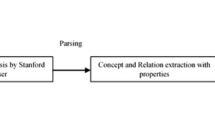Abstract
The article describes the developed method of extracting semantic trees from text resources. This method is based on the use of a sequence of linguistic algorithms in constructing a syntactic sentence tree. The basis of the developed method is the algorithm for translating syntax trees of text fragments into the structures of semantic trees using a set of rules. A formal model of the rules is presented. The resulting semantic trees can be combined into a domain ontology taking into account the built-in relations between objects in the wiki resource. An example of our approach is also presented.
Access this chapter
Tax calculation will be finalised at checkout
Purchases are for personal use only
Similar content being viewed by others
References
Konstantinova, N.S., Mitrofanova, O.A.: Ontology as a knowledge storage system. Portal “Information and Communication Technologies in Education”. http://www.ict.edu.ru/ft/005706/68352e2-st08.pdf. Accessed 21 Mar 2018
Hepp, M.: Products and services ontologies: a methodology for deriving OWL ontologies from industrial categorization standards. Int. J. Semant. Web Inf. Syst. (IJSWIS) 2(1), 72–99 (2006)
Damljanovic, D., Agatonovic, M., Cunningham, H.: Natural language interfaces to ontologies: combining syntactic analysis and ontology-based lookup through the user interaction. Lecture Notes in Computer Science, vol. 6088, pp. 106–120 (2010)
Pazienza, M., Pennacchiotti, M., Zanzotto, F.: Terminology extraction an analysis of linguistic and statistical approaches. Studies in Fuzziness and Soft Computing, vol. 185, pp. 255–279 (2004)
Kovacevic, A., Konjovic, Z., Milosavljevic, B., Nenadic, G.: Mining methodologies from NLP publications: a case study in automatic terminology recognition. Comput. Speech Lang. 26, 105–126 (2012)
Zarubin, A., Koval, A., Filippov, A., Moshkin, V.: Application of syntagmatic patterns to evaluate answers to open-ended questions. In: CITDS-2017. Communications in Computer and Information Science, pp. 150–162. Springer (2017)
Zarubin, A.A., Koval, A.R., Moshkin, V.S., Filippov, A.A.: Construction of the problem area ontology based on the syntagmatic analysis of external wiki-resources. http://ceur-ws.org/Vol-1903/paper26.pdf. Accessed 03 Mar 2018
Shestakov, V.K.: Development and maintenance of information systems based on ontology and Wiki-technology. In: 13-and All-Russian Scientific Conference, RCDL 2011, Voronezh, pp. 299–306 (2011)
Bizer, C., Lehmann, J., Kobilarov, G., Auer, S., Becker, C., Cyganiak, R., Hellmann, S.: DBpedia – a crystallization point for the web of data. J. Web Semant. Sci. Serv. Agents World Wide Web 7, 154–165 (2009)
Suchanek, F.M., Kasneci, G., Weikum, G.: YAGO: a core of semantic knowledge unifying WordNet and Wikipedia. In: Proceedings of the 16th International Conference on World Wide Web, Banff, Alberta, Canada, 8–12 May 2007, pp. 697–706. ACM Press, New York (2007)
Suchanek, F.M., Kasneci, G., Weikum, G.: YAGO: a large ontology from Wikipedia and WordNet. Web Semant. Sci. Serv. Agents World Wide Web 6(3), 203–217 (2008)
Subkhangulov, R.A.: Ontological search for technical documents based on the intelligent agent model. Autom. Manag. Process. 4(38), 85–91 (2014)
Astrakhantsev, N.A., Fedorenko, D.G., Turdakov, D.Y.: Automatic enrichment of informal ontology by analyzing a domain–specific text collection. In: Materials of International Conference “Dialog”, vol. 13, no. 20, pp. 29–42 (2014)
Cui, G.Y., Lu, Q., Li, W.J., Chen, Y.R.: Corpus exploitation from Wikipedia for ontology construction. In: Proceedings of the Sixth International Language Resources and Evaluation (LREC 2008), Marrakech, pp. 2125–2132 (2008)
Hepp, M., Bachlechner, D., Siorpaes, K.: Harvesting wiki consensus – using Wikipedia entries as ontology elements. In: Proceedings of the First Workshop on Semantic Wikis – From Wiki to Semantics, Annual European Semantic Web Conference (ESWC 2006), pp. 124–138 (2006)
McGuinness, D.L., Fikes, R., Rice, J., Wilder, S.: An environment for merging and testing large ontologies. In: KR 2000, pp. 483–493 (2000)
Noy, N.F., Musen, M.A.: The PROMPT suite: interactive tools for ontology merging and mapping. Int. J. Hum.-Comput. Stud. 59(6), 983–1024 (2003)
Pottinger, R.: Mapping-based merging of schemas. In: Schema Matching and Mapping, pp. 223–249. Springer, Berlin (2011)
Raunich, S., Rahm, E.: Automatic target-driven ontology merging with ATOM. In: Information Systems, Pergamon, vol. 42, pp. 1–14
Raunich, S., Rahm, E.: Target-driven merging of taxonomies. Cornell University Library (2010). https://arxiv.org/ftp/arxiv/papers/1012/1012.4855.pdf. Accessed 18 Feb 2018
Sokirko, A.V.: Semantic words in automatic processing. Dissertation, Ph.D. (05.13.17); State Committee of the Russian Federation for Higher Education Russian State University for the Humanities, p. 120 (2001)
Boyarskiy, K.K., Kanevskiy, Ye.A.: Semantico-syntactic parser semsin, scientific and technical herald of information technologies. Mech. Opt. 5, 869–876 (2015)
Artemov, M.A., Vladimirov, A.N., Seleznev, K.Ye.: Survey of natural text analysis systems in Russian. Sci. J. Bull. Voronezh State Univ. http://www.vestnik.vsu.ru/pdf/analiz/2013/02/2013-02-31.pdf. Accessed 22 Mar 2018
Automatic text processing. http://aot.ru. Accessed 22 Mar 2018
Acknowledgments
This work was financially supported by the Russian Foundation for Basic Research (Grants No. 16-47-732054 and 18-37-00450) and Ministry of Education and Science of Russia in framework of project № 2.4760.2017/8.9 and Russian Foundation of base Research in framework of project № 17-07-00973 A.
Author information
Authors and Affiliations
Corresponding author
Editor information
Editors and Affiliations
Rights and permissions
Copyright information
© 2019 Springer Nature Switzerland AG
About this paper
Cite this paper
Yarushkina, N., Filippov, A., Moshkin, V., Dyakov, I. (2019). The Approach to Extracting Semantic Trees from Texts to Build an Ontology from Wiki-Resources. In: Abraham, A., Kovalev, S., Tarassov, V., Snasel, V., Sukhanov, A. (eds) Proceedings of the Third International Scientific Conference “Intelligent Information Technologies for Industry” (IITI’18). IITI'18 2018. Advances in Intelligent Systems and Computing, vol 874. Springer, Cham. https://doi.org/10.1007/978-3-030-01818-4_13
Download citation
DOI: https://doi.org/10.1007/978-3-030-01818-4_13
Published:
Publisher Name: Springer, Cham
Print ISBN: 978-3-030-01817-7
Online ISBN: 978-3-030-01818-4
eBook Packages: Intelligent Technologies and RoboticsIntelligent Technologies and Robotics (R0)




